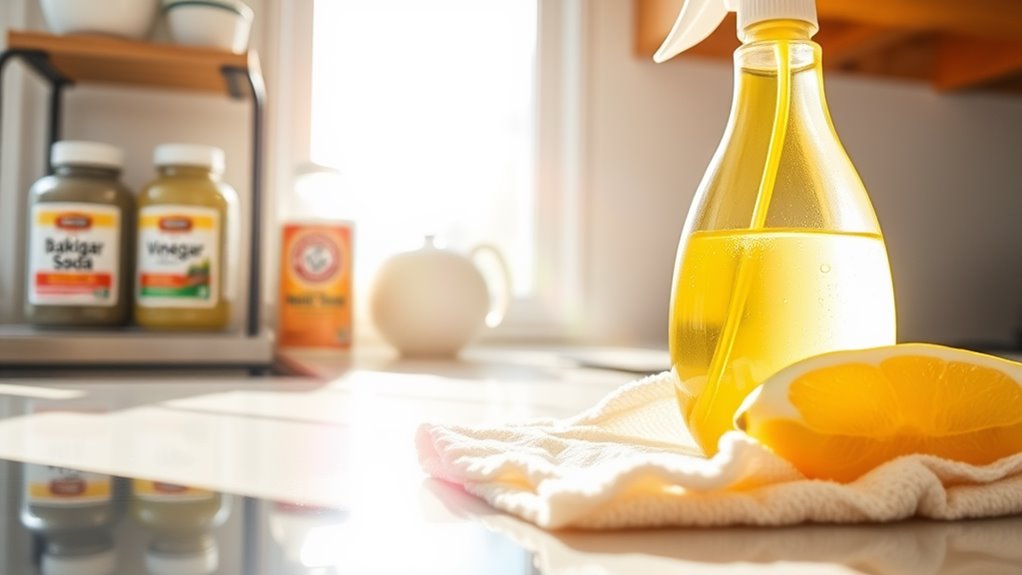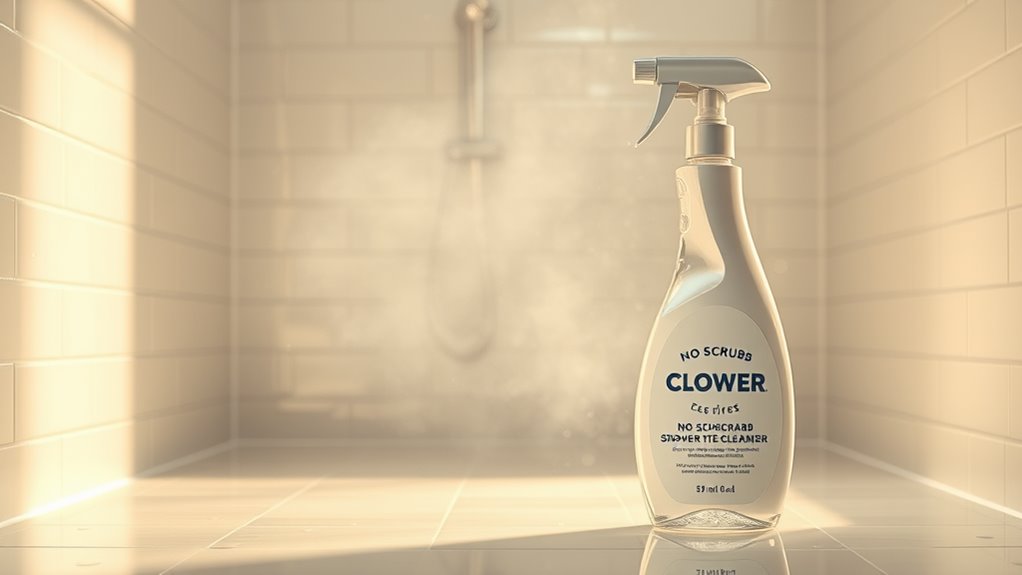My Go-To DIY Spray for Sparkling Clean Countertops
For sparkling clean countertops, mix one cup of distilled water with one cup of white vinegar and add 10-15 drops of your favorite essential oil. This solution cuts through grime and disinfects naturally. Spray it on the surface from 6-8 inches away, using a microfiber cloth to wipe it clean. For tougher stains, let it sit for a minute. Want to discover more cleaning tips tailored for different surfaces? Keep on exploring!
Key Takeaways
- Combine one cup of distilled water with one cup of white vinegar for an effective DIY cleaning spray.
- Add 10-15 drops of essential oil for fragrance and antibacterial benefits.
- Store the solution in a dark glass bottle to protect it from sunlight and maintain freshness.
- Spray from 6-8 inches away and use a microfiber cloth for optimal cleaning results.
- Regularly test your spray on a small area first to avoid damaging different countertop materials.
Essential Ingredients for Your DIY Spray
When you want to whip up an effective DIY spray for your countertops, knowing the essential ingredients can make all the difference.
Start with white vinegar; it’s a powerful natural disinfectant that cuts through grime. Combine it with distilled water to dilute its acidity, making it safe for various surfaces. This combination not only cleans but also sanitizes surfaces effectively. Additionally, vinegar can help eliminate harmful bacteria that may linger on your countertops. Using natural ingredients in your cleaning routine is not only effective but also promotes a healthier home environment. Furthermore, using eco-friendly cleaners can help reduce your impact on the environment.
Add a few drops of dish soap to enhance the cleaning power, breaking down stubborn stains. For a revitalizing scent and additional antibacterial properties, consider including essential oils like tea tree or lavender.
Finally, a touch of baking soda can help with tough spots, giving your countertop spray a little extra grit. Additionally, using natural disinfectants can ensure that your cleaning solution is both effective and safe for your household.
With these ingredients, you’ll create a potent solution for sparkling clean countertops every time.
Mixing Instructions for the Perfect Solution
To create the perfect DIY spray for your countertops, you’ll need to know the essential ingredients and how to mix them. Using natural ingredients not only helps in cleaning but also contributes to a healthier home environment. Moreover, many of these natural disinfectants are effective against a wide range of germs and bacteria. It’s important to note that some commercial cleaning products can damage countertop surfaces, so opting for a DIY solution is a safer choice. The effectiveness of your cleaner can be enhanced by using essential oils known for their antibacterial properties. Additionally, certain natural disinfectants can be particularly effective against viruses and bacteria, making them a great choice for your home. Pay attention to the mixing ratios, as they can make all the difference in effectiveness. Additionally, storing your solution properly will guarantee it stays fresh for your next cleaning session.
Essential Ingredients Required
Creating an effective DIY spray for clean countertops requires just a few essential ingredients that you likely already have at home. You’ll need white vinegar, which acts as a powerful cleaner and disinfectant, and it’s great for cutting through grease.
Next, grab some water to dilute the vinegar. If you want an invigorating scent, consider adding a few drops of essential oils like lemon or tea tree oil. These not only impart a pleasant aroma but also offer additional antibacterial properties.
Finally, a spray bottle is essential for easy application. With these simple components, you’re well on your way to mastering a homemade solution that leaves your countertops sparkling and hygienic.
Get ready to elevate your cleaning routine!
Mixing Ratio Tips
Now that you’ve gathered your ingredients, it’s time to focus on the mixing ratios for your DIY countertop spray. For maximum cleanliness, combine one cup of distilled water with one cup of white vinegar.
This equal ratio harnesses the power of vinegar’s acidity while maintaining a balanced solution that won’t damage your surfaces. If you prefer a more fragrant spray, add 10-15 drops of essential oil—like lemon or lavender—into the mix.
This not only enhances the scent but also adds antibacterial properties. Remember, if you’re tackling tougher stains, consider increasing vinegar to 1.5 cups while reducing water slightly.
Adjusting these ratios allows you to customize your spray, ensuring you achieve that sparkling clean finish you desire.
Storage Recommendations
Proper storage is key to maintaining the effectiveness of your DIY countertop spray. By following these simple recommendations, you’ll guarantee your solution remains potent and ready for use:
-
Use a dark glass bottle**** to protect the ingredients from sunlight, which can degrade their effectiveness.
-
Keep it tightly sealed to prevent evaporation and contamination.
-
Store in a cool, dry place**** to maintain the integrity of the solution.
-
Label the bottle clearly with the contents and date you mixed it, so you know when to replace it.
-
Avoid storing near heat sources like stoves or radiators, as heat can alter chemical compositions.
Application Methods for Maximum Effectiveness
To guarantee your DIY spray cleans countertops effectively, it’s essential to apply it correctly. Start by holding the spray bottle about 6-8 inches from the surface. A light mist is ideal; too much can lead to streaks. Use a microfiber cloth to wipe, ensuring you cover every inch. For tough spots, let the spray sit for a minute before wiping. Additionally, consider using a mop-free method to keep your kitchen floors clean and enhance the overall cleanliness of your space. Implementing innovative cleaning shortcuts can further streamline your cleaning routine. A clean sink area is also vital for maintaining a hygienic environment in your kitchen. Remember, using natural ingredients like vinegar and baking soda can create an effective cleaner that’s also safe for your home. These natural ingredients not only clean but also offer antimicrobial properties that help to disinfect surfaces effectively.
Here’s a quick reference table for your application methods:
| Method | Description |
|---|---|
| Mist & Wipe | Lightly spray and wipe with cloth |
| Soak & Scrub | Apply generously, let sit, then scrub |
| Targeted Spray | Focus on stains, let sit, then wipe |
| Final Polish | Light spray for shine after cleaning |
Tips for Cleaning Different Counter Surfaces
When you’re cleaning different countertop surfaces, understanding their unique characteristics is key to achieving the best results.
Each material requires specific care to maintain its appearance and longevity. Here are some tips to take into account:
-
Granite: Use a pH-balanced cleaner; avoid acidic solutions that can etch the surface.
-
Laminate: Stick to gentle cleaners; harsh chemicals can cause fading or warping.
-
Marble: Use a soft cloth and a mild soap solution; prevent stains by wiping spills immediately.
-
Stainless Steel: Apply a specialized cleaner for a streak-free finish; always wipe in the direction of the grain.
-
Wood: Clean with a damp cloth and a wood-safe cleaner; avoid soaking to prevent warping.
Master these techniques for sparkling, well-maintained countertops!
Safety Precautions to Consider
Cleaning countertops involves more than just using the right products; safety should always be a priority.
Before you plunge into your DIY spray, make certain you’re wearing gloves to protect your skin from any irritants. Always work in a well-ventilated area; good airflow helps disperse any fumes.
Keep your ingredients out of reach of children and pets, as some components can be harmful if ingested. If you’re using essential oils, remember that not all are safe for every surface—test a small area first.
Finally, store your homemade cleaner in a clearly labeled container, away from direct sunlight.
Eco-Friendly Benefits of Homemade Cleaners
Not only do homemade cleaners help you achieve a spotless kitchen, but they also offer significant eco-friendly benefits.
When you whip up your own cleaning spray, you’re making choices that positively impact the environment.
Here’s why you should embrace homemade cleaners:
-
Reduced Chemical Exposure: You eliminate harmful toxins found in commercial products.
-
Less Plastic Waste: Reuse containers instead of contributing to single-use plastics.
-
Sustainable Ingredients: Use natural items like vinegar and baking soda, which are biodegradable.
-
Cost-Effective: Save money by using ingredients you probably already have at home.
-
Customizable Formulas: Tailor your cleaner to suit your preferences without compromising quality.
Storing Your DIY Cleaning Spray Properly
Homemade cleaners can be just as effective as their commercial counterparts, but proper storage is key to maintaining their potency and safety.
To guarantee your DIY cleaning spray remains effective, always use a dark glass or high-density polyethylene (HDPE) container. These materials protect against light degradation and chemical reactions.
Label your bottles with the ingredients and date of creation, so you know when to replace them. Store your cleaners in a cool, dry place, away from direct sunlight and heat sources. This helps preserve the integrity of the ingredients.
Finally, keep them out of reach of children and pets for safety.
Frequently Asked Questions
Can I Use This Spray on Glass Surfaces?
Yes, you can use this spray on glass surfaces. Just make sure to apply it lightly and wipe with a microfiber cloth for a streak-free shine. Your glass will look crystal clear and sparkling clean!
How Often Should I Clean My Countertops?
You should clean your countertops daily to prevent bacteria buildup. For deeper cleans, aim for once a week. Regular maintenance keeps surfaces hygienic and visually appealing, ensuring your kitchen remains a welcoming environment for everyone.
Is This DIY Spray Safe for Food Contact?
Yes, this DIY spray is safe for food contact if you use food-grade ingredients. Just guarantee you rinse surfaces thoroughly after cleaning to remove any residue, and you’ll maintain a safe, sparkling kitchen environment.
Can I Add Essential Oils for Fragrance?
Absolutely, you can add essential oils for fragrance! Just be mindful of the quantity; a few drops can enhance your spray without overpowering it. Experiment with different oils to discover your perfect scent combination.
What Should I Do if I Experience Skin Irritation?
If you experience skin irritation, stop using the product immediately. Rinse the affected area with water and mild soap. Monitor your skin’s reaction, and consult a healthcare professional if irritation persists or worsens.



